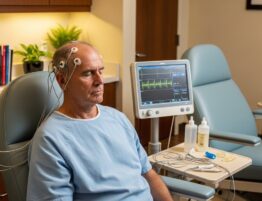What seems like a simple loss of smell might actually be your brain’s earliest cry for help. Olfactory dysfunction – impaired smell – affects millions worldwide, yet remains one of medicine’s most overlooked symptoms. While we readily treat vision or hearing problems, smell loss is often dismissed as normal aging.
Recent research reveals smell disorders as neurological warning signs. Parkinson’s disease typically announces itself through tremors, but 90% of patients experience smell loss years before their first tremor. This connection extends to other neurodegenerative diseases like Alzheimer’s, where olfactory changes often appear first. Understanding this sensory gateway could revolutionize early detection and treatment.
How the Brain Processes Smell Signals
The brain processes smell signals to perform various functions. The brain perceives smells through a complex and remarkable process. We can distinguish between pleasant and unpleasant odors. Damage to olfactory receptors causes specific symptoms and can lead to serious problems. Smell impairment can be a sign of serious diseases. LoneStar Neurology cares about each patient and will help to choose a personalized treatment. Smell is essential for each person, and here is how this system works:
- Different odors enter the olfactory system when we breathe. We can detect pleasant scents that may help us relax.
- These odors activate olfactory neurons located in the nose. The neurons send signals through nerves to the brain.
- These signals are transmitted to the cerebral cortex, which processes emotions and recognition. We can recognize and identify different smells that are pleasant to us or vice versa.
Loss of smell can indicate serious neurodegenerative diseases. Smell is directly related to neurology because it involves sensory pathways to the brain. The brain receives information and recognizes different smells. Damage to this process disrupts brain processes. People can experience serious complications and neurological dysfunction. To solve these problems, it is important to seek professional help from doctors.
Early Detection of Parkinson’s Through Smell Loss
Our sense of smell allows us to identify different odors that are processed by the brain. Smell impairment due to specific reasons can later cause a complete loss. Loss is accompanied by negative symptoms that can indicate serious diseases. Today, there are many ways to improve your health and maintain it. However, smell problems can help doctors detect serious diseases early. The main symptom of Parkinson’s disease is problems with the olfactory system. Here is why smell is impaired in this disease:
- Abnormal proteins accumulate in nerve cells. Large quantities of this protein accumulate, leading to loss of olfactory receptors.
- These changes can lead to disruption of standard brain functionality. Structural brain changes occur specifically in the olfactory bulb.
- A neurological warning sign is a weakening of the sense of smell and a decrease in sensitivity to various smells. People find it difficult to recognize smells or enjoy them. After some time, a complete loss of the ability to perceive any smells is possible.
Most people in the early stages of the disease notice a weakening of these receptors. They cannot distinguish certain smells, which can contribute to depression. People may experience sleep disturbances, which can indicate disease progression. To avoid neurodegenerative diseases, it is important to consult a doctor after the first symptoms. Most people assume smell loss is simply due to colds or allergies. However, talking to a doctor will help identify the cause or make sure that the person is healthy.
Alzheimer’s Disease and Olfactory Dysfunction
In the early stages of the progression of certain diseases, patients notice problems with smell. They may experience a complete loss or partial loss for a specific period. Problems with smell occur as symptoms before the onset of severe Alzheimer’s disease. Patients immediately complain of unpleasant sensations and underestimate these symptoms. They may even lose their memory and feel worse about various smells. The problem is quite serious and needs to be resolved quickly. Everyone can contact us and visit us in cities such as Garland, Richardson, and others. Here is how this disease has a profound impact on smell:
- In the early stages, the brain structure begins to suffer due to specific changes. People experience memory deterioration and emotional changes. Concentration becomes difficult due to disruption of the olfactory bulb that perceives smell.
- Before the onset of Alzheimer’s disease, signals between neurons and olfactory processing are disrupted in a person. A person may completely lose the ability to perceive any smells. This process can lead to depression and emotional changes.
Premature changes in smell can indicate serious diseases. Early detection will help to take specific measures for personalized treatment. With proper therapy and medication, people can maintain better health. To avoid neurological problems, any loss or smell impairment requires examination by a doctor.
Why Smell Impairment Is a Neurological Red Flag
An impaired sense of smell is a serious neurological warning sign. This symptom can cause anxiety as it may indicate serious diseases. The change occurs gradually and is a rather serious problem. It serves as an early warning sign requiring immediate attention. Early examination can confirm good health or enable prompt treatment. Here is how smell is directly connected to the brain:
- Our olfactory system is connected to the brain system called the limbic system. This system controls emotions, mood, and behavior.
- Smell impairment can occur as the first symptom and as a warning. Often, this symptom’s progression indicates various serious diseases. People may develop multiple sclerosis or experience vitamin deficiencies.
- Signals are transmitted through the olfactory center to the brain, where they are unchanged. However, impaired or lost sense of smell can indicate brain dysfunction.
The loss of an important sense is a serious problem that needs to be addressed. People may experience phantom smells before losing their sense of smell entirely. Mild fatigue, drowsiness, and memory loss are additional symptoms. The neurological warning sign is vital for early treatment. Timely actions will help determine the stage of disease progression and prescribe treatment.
Diagnostic Tools and Smell Tests in Neurology
Early detection of olfactory problems can help maintain health. Olfactory testing is an excellent procedure for its early detection. Testing will help protect a person’s health and prevent neurodegenerative issues. Here are some interesting methods of olfactory testing that have been tested over time:
- A special UPSIT test technology is used to test the sense of smell. Patients must identify specific odors on test cards. This test is widely used to diagnose dysfunction and guide future treatment.
- Olfactory dysfunction testing using the Sniffin’ Sticks Test is a unique tool. Doctors help detect olfactory sensitivity and identify odors that a person perceives. This test uses special scented markers with different odors.
These tests are essential for neurological diagnostics. They help identify symptoms of cognitive dysfunction and introduce specific treatment methods. Assessing the patient’s condition helps determine treatment. Health is vital for everyone and must be protected. Any neurological warning sign requires evaluation to determine whether there is a problem.
Addressing Early Signs with Preventive Neurology
Serious neurodegenerative diseases begin with almost imperceptible symptoms. Monitoring your health is essential for every person. Today, a fairly common problem is the inability to recognize smells. People may experience serious smell problems that cause constant discomfort. A decrease or complete loss of smell leads to serious neurodegenerative issues. The first step is to evaluate the changes and consult a doctor. Here is what is essential to do with smell impairment:
- Every person should monitor their well-being. Fatigue, sleep disturbance, and emotional instability are the first symptoms. Pay attention to hand numbness, trembling, and changes in your sense of smell.
- Never try to self-diagnose, and don’t dismiss smell problems as unrelated to other symptoms. Diseases or viral infections are also accompanied by olfactory dysfunction. However, it is important to remember that after an illness, the sense of smell should return; otherwise, consult a doctor.
- For any concerning symptoms, consult a doctor. A neurologist will help check your condition and conduct several tests. The doctor will help identify neurological problems and prescribe treatment.
- You can take several tests for vitamins and thyroid function. Often, these tests are quite effective in detecting other problems in the body. Medical tests are the best way to assess someone’s health.
Early detection of any symptoms is a serious warning sign. Always keep a diary and record your well-being and changes. Memory impairment, mood disturbances, or sleep problems are common symptoms.









I've given up... the stress her office staff has put me through is just not worth it. You can do so much better, please clean house, either change out your office staff, or find a way for them to be more efficient please. You have to do something. This is not how you want to run your practice. It leaves a very bad impression on your business.
Please, leave your review
Write a comment: